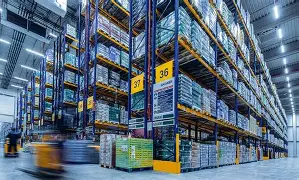Introduction
Every product people use, from food on the table to clothes in the closet, travels through a long journey before reaching its final destination. A major part of this journey depends on warehousing logistics. This term refers to the way goods are stored, organized, and moved to ensure they arrive safely and on time.
In this blog, readers will learn why warehousing logistics is important, how it shapes the global supply chain, and how companies like McLane Global have grown by relying on strong warehouse systems. The goal is to show how simple yet powerful logistics strategies connect businesses to customers worldwide.
Understanding Warehousing Logistics
Warehousing logistics is more than storing products in a large building. It involves careful planning and organization so that goods remain safe and ready for distribution.
1. Safe Storage of Products
One key part of warehousing logistics is keeping products in proper conditions. For example, frozen foods must be stored at very low temperatures, while dry items like cereals need protection from moisture. By separating and organizing products, warehouses prevent spoilage and keep customers safe.
2. Streamlined Distribution
Moreover, logistics focuses on moving products quickly and accurately. Retailers and wholesalers often place large orders, and warehouses must prepare these shipments efficiently. A well-managed system ensures that businesses receive the right products at the right time, reducing delays and costs.
The Journey of McLane Global in Warehousing Logistics
To understand the power of logistics, it helps to look at a real example.
1. From Local Grocery to Global Network
In the late 1800s, the McLane family opened a small grocery store in Cameron, Texas. Their mission was simple yet strong: provide quality products at fair prices. Over the years, the business grew beyond Texas and reached new regions.
By 1958, the company created McLane Global with a vision to bring top American and private label brands to international markets. Today, McLane Global is respected worldwide for its supply chain and distribution services. This success was made possible through careful investment in warehousing logistics.
2. Building Trust Through Quality Systems
McLane Global built its reputation by ensuring that every product moves through warehouses with strict attention to quality and safety. Their warehouses follow both national and international standards, which strengthens consumer trust. This focus has helped the company maintain long-term partnerships with businesses and retailers worldwide.
Benefits of Warehousing Logistics for Businesses
Warehousing logistics provides many benefits for both companies and customers.
1. Helping Companies Grow
With strong logistics systems, businesses can expand into new markets. For example, a local snack producer can use warehousing services to distribute products not only in the United States but also overseas. Logistics makes growth possible by removing barriers in storage and delivery.
2. Reducing Waste and Saving Costs
Another important benefit is reducing waste. Products stored correctly are less likely to spoil or get damaged. This not only saves businesses money but also helps the environment by lowering the amount of food or goods thrown away.
3. Supporting Retailers and Shoppers
Conversely, without good warehousing logistics, stores would struggle to keep shelves stocked. Shoppers expect to find their favorite products when they visit stores, and warehouses make that possible by ensuring smooth supply.
The Future of Warehousing Logistics
As business and technology evolve, warehousing logistics is also changing.
1. Technology and Automation
Modern warehouses are using advanced tools like smart sensors and automated machines. Sensors check conditions such as temperature and humidity, while machines help move products quickly. These technologies improve safety, reduce mistakes, and make distribution faster.
2. Sustainable Practices
Moreover, warehouses are adopting sustainable practices to reduce their impact on the environment. Solar energy, energy-efficient equipment, and recyclable packaging are becoming common. These efforts reflect consumer demand for greener supply chains and create long-term benefits for the planet.
3. Meeting Global Demand
The growth of international trade means that warehousing logistics will remain essential. Companies like McLane Global are expanding their global networks to meet rising demand for American products abroad. Without logistics systems, it would be nearly impossible to deliver goods across borders while keeping them safe and fresh.
Challenges in Warehousing Logistics
While the benefits are clear, logistics also faces challenges that must be addressed.
1. Rising Costs
Warehouses must deal with increasing costs for energy, labor, and transportation. Companies are finding solutions by investing in efficiency, such as automated systems, which help lower long-term expenses.
2. Balancing Speed and Quality
Customers today expect faster delivery. However, warehouses must balance this demand with the need for quality and safety. McLane Global demonstrates how careful planning can achieve both goals without compromise.
3. Maintaining Safety Standards
Finally, meeting strict safety standards is a constant responsibility. This is especially true for food-related warehouses, where even small mistakes can cause recalls or health risks. Ongoing training, inspections, and compliance with regulations are necessary to protect consumers.
Conclusion
Warehousing logistics is the backbone of modern trade. It ensures that products are stored safely, reduces waste, and supports business growth. From small stores to large international brands, everyone relies on these systems to keep goods moving smoothly.
The story of McLane Global shows how strong logistics can turn a small grocery store into a trusted global leader. By focusing on quality, safety, and innovation, McLane Global continues to connect businesses and consumers worldwide.
As technology and sustainability continue to shape the future, warehousing logistics will remain an essential part of global commerce. It not only supports businesses but also ensures that people everywhere have access to the products they need every day.












